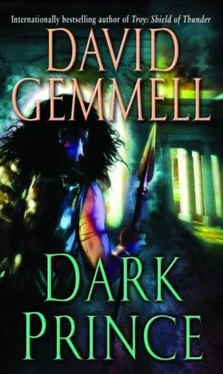David Gemmell - Dark Prince
Здесь есть возможность читать онлайн «David Gemmell - Dark Prince» весь текст электронной книги совершенно бесплатно (целиком полную версию без сокращений). В некоторых случаях можно слушать аудио, скачать через торрент в формате fb2 и присутствует краткое содержание. Год выпуска: 2011, ISBN: 2011, Издательство: Hachette UK, Жанр: Старинная литература, на английском языке. Описание произведения, (предисловие) а так же отзывы посетителей доступны на портале библиотеки ЛибКат.
- Название:Dark Prince
- Автор:
- Издательство:Hachette UK
- Жанр:
- Год:2011
- ISBN:9781405512107
- Рейтинг книги:4 / 5. Голосов: 1
-
Избранное:Добавить в избранное
- Отзывы:
-
Ваша оценка:
- 80
- 1
- 2
- 3
- 4
- 5
Dark Prince: краткое содержание, описание и аннотация
Предлагаем к чтению аннотацию, описание, краткое содержание или предисловие (зависит от того, что написал сам автор книги «Dark Prince»). Если вы не нашли необходимую информацию о книге — напишите в комментариях, мы постараемся отыскать её.
Dark Prince — читать онлайн бесплатно полную книгу (весь текст) целиком
Ниже представлен текст книги, разбитый по страницам. Система сохранения места последней прочитанной страницы, позволяет с удобством читать онлайн бесплатно книгу «Dark Prince», без необходимости каждый раз заново искать на чём Вы остановились. Поставьте закладку, и сможете в любой момент перейти на страницу, на которой закончили чтение.
Интервал:
Закладка:
'Whatever you think fit. How have the men taken his death?'
'He was popular,' Mothac answered. 'But they are hard men. You impressed them with your ride.' He chuckled suddenly. 'By Heracles, you impressed me!'
'I will never see another horse like him,' said Parmenion sadly.
'I think you might. The foal is the image of his sire. And he will be big — he has a head like a bull.'
'I saw him in the stables last night — with his dead mother. Not a good omen for the son of Titan — his first act in life to kill his dam.'
'Now you are sounding like a Thessalian,' Mothac admonished him. The Theban drank deeply from the water-jug and leaned back on his powerful forearms. 'What is wrong between you and Philip?'
Parmenion shrugged. 'He is a King is search of a glory he does not wish to share. I cannot say I blame him for that.
And he has the lickspittle Attalus to whisper poison in his ear.'
Mothac nodded. 'I never liked the man. But then I never liked Philip much either. What will you do?'
The Spartan smiled. 'What is there to do? I will fight Philip's battles until he decides he has no more need of me.
Then I will come here and grow old with my sons around me.'
Mothac grunted and swore. 'You would be a fool to believe that — and you are no fool. If you left Philip, every city in Greece would vie for your services. Within a season you would be leading an army. And, since there is only one great enemy, you would be leading it against Philip. No, Parmenion, when Philip decides he needs you no longer it will be Attalus who delivers the dismissal — with an assassin's knife.'
Parmenion's pale blue eyes grew cold. 'He will need to be very good.'
'And he is,' warned Mothac.
'This is a gloomy conversation,' Parmenion muttered, rising to his feet.
'Has the King invited you to the victory parade?' Mothac persisted.
'No. But then he knows I do not enjoy such events.'
'Perhaps,' said Mothac, unconvinced. 'So, where will the next war be fought? Will you march on the cities of the Chalcidice, or down through Boeotia to sack Athens?'
'That is for the King to decide,' answered Parmenion, his gaze straying to the eastern mountains. The look was not lost on the Theban.
'Then it is to be Thrace,' he said, his voice low.
'You see too much, my friend. I thank the gods you also have a careful tongue.'
'Where will his ambition end?'
'I don't know. More to the point, he does not know. He is not the man I once knew, Mothac; he is driven now. He had hundreds of Phocians executed after the Crocus Field, and it was said he stood and laughed as they died. Yet before we left Macedonia I watched him judge several cases at court. I knew, on this particular day, that he wanted to hunt and was hoping to conclude by early afternoon. At last he declared an end to the proceedings, telling the petitioners to come back on another day. But as he left the judge's chair an old woman with a petition came close to him, calling out for justice. He turned and said, "No time, woman." She just stood there for a moment and then, as he walked on, shouted: "Then you've no time to be King!" Everyone close by held their breaths. Was she to be executed? Or flogged? Or imprisoned? You know what he did? He cancelled the hunt and listened to her case for the rest of the day. He even judged it in her favour.'
Mothac rose and waved for the boat to come out to them. 'I did not say he was not a great man, Parmenion. I merely pointed out that I do not like him, and I do not trust him. Neither should you. One day he will order your death.
Jealousy breeds fear, and fear sires hatred.'
'No one lives for ever,' replied Parmenion uneasily.
Pella, Macedonia, Autumn
'I shall walk ahead of the Guards. My people will see me,' said Philip.
'Madness!' snapped Attalus. 'What more can I say to you? There are killers in Pella, just waiting for the opportunity to come at you. Why are you set on this course?'
'Because I am the King!' thundered Philip.
Attalus sat back on the couch staring sullenly at his monarch. 'You think,' he asked finally, 'that you are a god? That cold iron cannot penetrate your body, cannot slice your heart?'
Philip smiled and relaxed. 'No delusions, Attalus. How could I?' he added, touching the scar above his blinded right eye. 'But if I cannot walk in the streets of my own capital, then my enemies have truly won. You will be there. I trust you to protect me.'
Attalus looked into the King's face, seeing no compromise there, and recalled the first time they had met, in Thebes nineteen years ago. The King had been merely a boy then, a frightened boy waiting for the assassin's blade. Yet in his eyes had been the same fierce glow. His uncle the King, Ptolemaos, had tried to have him quietly poisoned, but the boy outwitted him, saving his brother Perdiccas and killing Ptolemaos as he lay in his bed. This he had achieved as a thirteen-year-old. Now, at thirty-two, Philip had united Macedonia, creating a nation to be feared.
But such pride was double-edged, Attalus knew, bringing either greatness or an early grave. Macedonian spies in the Chalcidean city of Olynthos reported that an elite group of assassins had been hired to end the threat of Philip of Macedon. It took no genius to realize they would strike at the Festival of Thanksgiving when the King, dressed only in tunic and cloak, walked unarmed among the crowds to the Temple of Zeus.
'Think of Alexander,' urged Attalus. 'If you are slain, then he will be in great peril. You have no other heirs, which means the nobles will fight amongst themselves to succeed you. Alexander would be killed.'
For a moment only Philip wavered, stroking his thick black beard and staring from the wide window. But when he turned back Attalus knew the cause was lost. 'I will walk among my people. Now, have enough flowers been distributed along the route?'
'Yes, sire,' answered Attalus wearily.
'I want them strewn before my feet. It will look good; it will impress the ambassadors. They must see that Macedonia is with me.'
'Macedonia is with you — regardless of whether they throw flowers.'
'Yes, yes. But it must be seen . The Athenians are stirring up more trouble. They do not have the finance to mount a campaign themselves, but they are working hard on the Olynthians. I do not desire a war — yet — with the Chalcidean League. Now how do I look?'
Attalus curbed his temper and gazed at the King. Of medium height, he was broad-shouldered and powerful, his black tightly curled hair and beard shining like a panther's pelt, the tawny flecks in his single green eye highlighted by the crown of golden laurel leaves. His tunic was summer blue, his cloak night black.
'You look splendid — a King of legend. Let us hope you look as fine at the end of the day.'
Philip chuckled. 'Always so gloomy, Attalus. Have I not made you rich? Are you even now not content?'
'I will be content when the day is over.'
'I will see you in the courtyard,' said Philip. 'Remember, no more than ten Guards to walk behind me.'
Alone now, Philip moved back to the long table, spreading the goatskin map across the surface. For too long the great cities, Athens, Sparta and latterly Thebes, had fought to rule Greece; their own enmities causing war after bloody war. Athens against Sparta, Sparta against Thebes, Thebes against Athens, with all the minor states sucked in.
Endless permutations of broken alliances, changing sides, shifting fortunes.
Macedonia had been covertly ruled by all three at different times.
Philip knew the endless wars were self-perpetuating, for the hundreds of cities and towns of northern Greece all paid homage to different masters. Any dispute between such cities could — and would — draw in the major powers. In Macedonia alone, when Philip came to power, there were more than twenty supposedly independent cities who offered no allegiance to the throne. Instead they formed alliances with Sparta, Athens, or Thebes, each city boasting its own small army or militia force. Many of them were coastal settlements, which meant safe landing for an invading army. One by one, during the seven years since he became King, Philip had taken these citadels, sometimes by force — as at Methone, where the population had been sold into slavery — but more often by coercion, bribery, or simply a careful blending of all three which men called diplomacy.
Читать дальшеИнтервал:
Закладка:
Похожие книги на «Dark Prince»
Представляем Вашему вниманию похожие книги на «Dark Prince» списком для выбора. Мы отобрали схожую по названию и смыслу литературу в надежде предоставить читателям больше вариантов отыскать новые, интересные, ещё непрочитанные произведения.
Обсуждение, отзывы о книге «Dark Prince» и просто собственные мнения читателей. Оставьте ваши комментарии, напишите, что Вы думаете о произведении, его смысле или главных героях. Укажите что конкретно понравилось, а что нет, и почему Вы так считаете.












